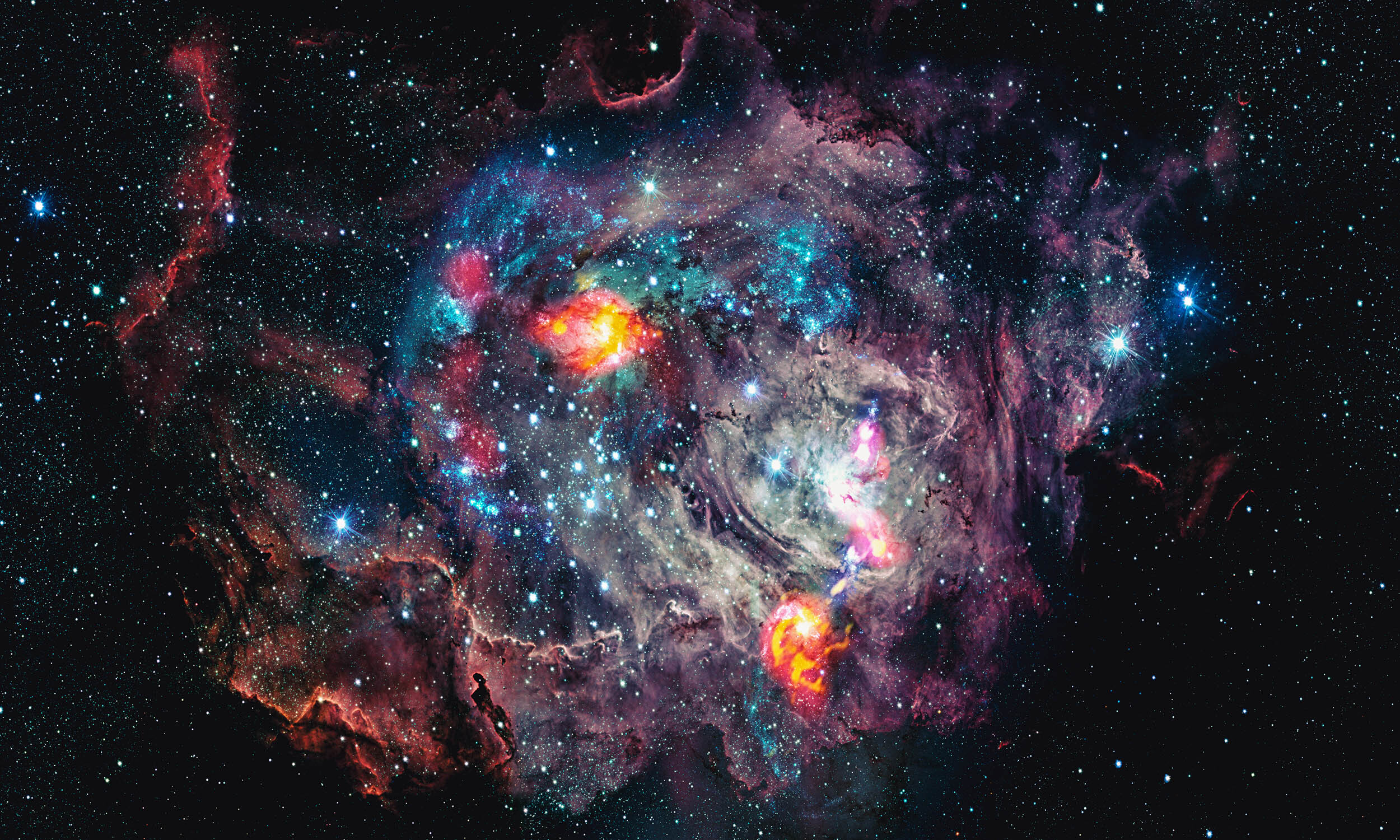Heh
“Tired light” has been theorized before, and it just doesn’t hold up to most of the evidence gathered.
It’s entirely possible that there’s something there, but most data currently backs up the Lambda-CDM model of the universe.
https://en.wikipedia.org/wiki/Lambda-CDM_modelOnly time will tell if this theory pans out, but I wouldn’t put much money on it.
This model explores the notion that the forces of nature diminish over cosmic time and that light loses energy over vast distances
Losing energy… to what?
You try being a bright ray of sunshine for everything around you all day every day. Sometimes you just get tired, ya know?
Wildass hypothesis I just pulled out of my ass with an undergraduate degree in applied physics: maybe interaction with particles emerging from quantum vacuum?
Okay, that sounds like great technobabble. I’m going to watch star trek now ;)
Seems you may be on to something. Virtual particle interactions seems to be a hypothesis for tired light.
To test this I suggest we reprogram the deflector dish to emit a low-power tachyon pulse to see if we can excite the non-baryonic mass interactions.
Don’t forget to reverse the polarity of the neutron flow!
Shit, if only my turbo encabulator wasn’t broken!
those are old tech.
obsolete even.
You sound like you know what you’re talking about. I’m taking notes. 📝🧐
It’s those damn inertial dampeners again
This doesn’t answer the question in the context of this theory, but the current understanding is that light does lose energy as it travels through expanding space. As the space it’s in expands, the wavelength gets longer, and the energy goes down. It doesn’t go anywhere; energy just isn’t conserved in an expanding space-time.
If the light loses energy, then it must surely lose it to something? And if your last point that energy isn’t being conserved in our universe, in which case we are either in some deep shit with the first law of thermodynamics, or our universe isn’t an isolated system.
Seems energy is not conserved.
https://www.preposterousuniverse.com/blog/2010/02/22/energy-is-not-conserved/
The thing about photons is that they redshift, losing energy as space expands. If we keep track of a certain fixed number of photons, the number stays constant while the energy per photon decreases, so the total energy decreases.
Further into the article he says that, "It would be irresponsible of me not to mention that plenty of experts in cosmology or GR would not put it in these terms. We all agree on the science; there are just divergent views on what words to attach to the science. In particular, a lot of folks would want to say “energy is conserved in general relativity, it’s just that you have to include the energy of the gravitational field along with the energy of matter and radiation and so on.” "
So energy is conserved on the whole, it’s just not conserved if you consider photons apart from their greater context.
Ok. Smarter people probably thought of this, and probably found my hypothesis to be impossible. But what if… It is the the other way around. What if photons are losing energy because they are expanding spacetime. Like tiny little springs expanding out.
The energy is actually not conserved across the universe in general relativity, as it is currently understood. Conversation of energy is due to the time symmetry, which the expansion of space breaks.
“Energy is conserved in general relativity, it’s just that you have to include the energy of the gravitational field along with the energy of matter and radiation and so on.”
Quote taken from Atzanteol’s article.
BTW, thanks! This comment sent me down a fascinating rabbit hole. It had simply never occurred to me that energy conversation didn’t apply in an expanding universe!
To the dark matter, of course.
;)
It’s probably not that the light is losing energy it’s just that the distance it travels over time (the time we “know” is supposed to take for a given distance) appears compressed because of unknown/unseen gravitational forces.
Think of it like this: If there were only one star in the universe and it emits a particle of light we could calculate the distance it would travel over time. Yet we know that star will still have a gravitational effect on that light… No matter how far away it gets.
That’s what they mean by light “losing energy”. Is the energy actually “lost”? Not really. Is this slowing (aka appearance of lost energy) caused by dark energy/dark matter or something more fundamental like spacetime itself being stretched or compressed due to the gravity of astronomical objects we can see or “dark matter”/“dark energy” or… ? We don’t really know for certain yet!
It’s probably not that the light is losing energy it’s just that the distance it travels over time (the time we “know” is supposed to take for a given distance) appears compressed because of unknown/unseen gravitational forces.
This doesn’t seem to be at all what tired light proposes though. What you’re explaining sounds like red-shift due to an expanding universe. From what I can tell they claim it actually loses energy through interaction with “other things” in the universe.
Entropy, capital “E”.
I didn’t see anything in the paper about the rotational speed of galaxies. Was that accounted for?
Or the effect we see on gravitational lensing that is accounted for by “dark matter”? I don’t see how that could be explained by “light losing energy”…
Modified Newtonian dynamics attempts to account for that.
Not an astronomer but if I read the article correctly the observations gathered about galaxies rotating and colliding would be explained instead by regional changes in what were previously assumed universal constants, which would be very interesting if true but 1 paper isn’t consensus yet
Man, lots of people in this thread seem happy to accept any wild, physics-breaking idea rather than accept that there’s just a bunch of matter we can’t see.
I think it goes beyond not being able to “see” it and goes to we can’t detect it at all. Doesn’t dark matter just fill in the mathemagical holes with some numbers to make it all work?
We can detect its gravitational influence, as it interacts via gravity. The issue being that gravity is a weak force, and so there’s a lot of room for speculation.
But there is a lot of evidence backing up dark matter existing. But it’s not definitive yet.
I get that but it still sounds woo-woo since we can’t directly detect it. I’m not naysaying since I realize it’s the best we have and I’m not smart enough to come up with anything better.
Dark matter is matter that we infir to exist only on its gravitational effects. We’ve observed its existence by the fact that it seems to clump up in the middle of two massive super-solar structures following a collision.
We can indirectly detect dark matter thru gravitational lensing. That is how NASA created this map showing the actual locations of dark matter in tinted blue.
https://science.nasa.gov/missions/hubble/hubbles-dark-matter-map/
That’s a cool one!
you can also sort of directly see it with certain colliding galaxies
I read several articles to try to understand this. This one was the most helpful to me.
https://bigthink.com/starts-with-a-bang/universe-13-8-or-26-7-billion-years/
Non paywalled version hopefully
I’m sure the article is great… IF I COULD READ IT

It says right there that the Galaxy is Folded into a Z…
/J
Made me spill my tea
- Don’t use Chrome
- Use Firefox
- Install unlock origin on android Firefox
- ???
- Profit!
Sorry I have so many paywalls and ad blockers going I had no idea it even had one.
Same for me but only on Desktop :/
Added it to that archive place for you and updated my first post.
Greatly appreciated! I love this site :D
How long until the young earth dipshits jump on this as “evidence” to claim that if there’s room to question whether the universe is 13.8 billion or 26.7 billion years old, that means it must actually be 6000?
Link to original study cited by article.
The Covarying Coupling Constants theory posits that the fundamental constants of nature,[…], are not fixed but vary across the cosmos.
This undermines current fundamental axiom of science that laws of physics are constant across universe. Until we go there and measure them to be actually different. This hypothesis doesn’t have a leg to stand on.
I’m skeptical of this theory as well, but I’d point out that our observations show that at galaxy scales, gravity is much stronger in certain places than we’d predict using our current model of gravity and the matter we can otherwise detect, and at even larger scales the acceleration of the universe’s expansion is being driven by something we don’t understand.
Right now, the dominant theory in cosmology is that each of these observed phenomena are driven by dark matter and dark energy, but we don’t have any direct evidence of the existence of either, just indirect evidence that stuff doesn’t behave as we might expect.
So it’s a choice between theories that don’t make intuitive sense, and break some fundamental assumptions about physics.
IANAP, but isn’t universal expansion understood to be accelerating? How would “weakening forces of nature” account for that? Assuming this energy could be “lost” (breaking an even longer standing and well tested principle of physics), that loss wouldn’t accelerate anything. At best the speed would remain neutral.
The tired light theory is an alternative explanation to the red shift of distant light that says it’s not because distant objects are all moving away from us but instead that the light somehow loses energy as it travels, which lowers its frequency.
There was another alternate theory that suggested everything was shrinking instead of the universe expanding (thus wavelengths seem longer by the time they get to us).
Personally, I’m more “open to the idea” than “sold” for the idea of the universe’s accelerated expansion. I like theories that eliminate the need for dark matter or energy, especially given that the current ones requiring them assume that they make up 95% of everything. It just seems more likely that we don’t understand things as well as we do than to assume we’re right about everything we think but just need to add 19 times what’s already here to balance it all out.
“Contrary to standard cosmological theories where the accelerated expansion of the universe is attributed to dark energy, our findings indicate that this expansion is due to the weakening forces of nature, not dark energy,” he continued.
So both dark matter and dark energy don’t exist?
So what did cern say they where trying to make?
Tired light makes a lot of sense to me 🥱
hogwash
There’s no dark matter, only dimension flattening weapons being fired at each other by advanced aliens.













